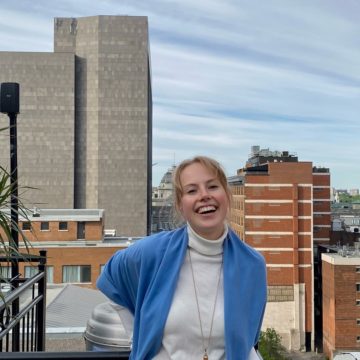Montréal, The Resilient

Being in school during the pandemic is not easy, and being an international student even less so. Sources of uncertainty pile up and create their own bunch of insecurity. The fear of contracting a deadly virus is compounded by the fear of not fitting into a city that is taking all necessary measures to ensure its socio-economic life runs smoothly during a public health crisis.
I am a foreign student from Russia doing my master’s degree in Montréal since 2019. Since I was quite young, it was clear to me that I would go study and live abroad. After a year abroad in Montréal, my dream took shape. Montréal immediately surprised me, seduced me and fascinated me. The city has a relaxed atmosphere. Having already travelled a bit, I can say that it’s not always the case for a big city, even less so for such a cosmopolitan city. Everything seems to be available, accessible and possible: training courses, employment, a cultural and social life that is so inclusive. There are plenty of activities in all areas.
In 2019, full of hope and motivation, I immersed myself in my studies at Université de Montréal.



Montréal, full of resources
I was quick to choose a master’s degree that included an internship, a criteria that would help me integrate into Montréal society and the job market. Montréal has several educational programs that include a mandatory internship for earning a diploma or degree. That’s not surprising as there are many opportunities for young people to get hired in a variety of workplaces eagerly awaiting for graduates. Every person can find an internship that suits them, there are so many options, and some are even very well paid.
During the Fall 2019 semester and Winter 2019 semester, I took part in some events organized for foreign nationals: Montréal Jobs, Arrondissement.com, I choose Montréal, LOJIQ, Foire nationale de l’emploi, in addition to job fairs organized by National Career Event, as well as other private and government agencies. The mood is good, it’s almost impossible to not be motivated.
Despite everything, sometimes I’m not sure where to find my dream job. I now know it doesn’t matter. The city, along with the governments of Québec and Canada, as well as educational institutions and professional associations mobilize all resources to publicize job offers to those looking for a job.
What’s more, Montréal is home to several international organizations, various research centres and industrial clusters that do have internships and job openings. As an example, for those interested in international affairs, Connexion Internationale de Montréal (CIMtl) can connect and equip young professionals in the Montréal area with jobs and launch them in their careers. The organization also offers a mentorship program whereby students and young professionals can receive support while looking for a job in their chosen field.



Transition to online studies
Yet, the pandemic changed everything. The public health crisis hit Montréal in March 2020 and universities adopted a new way of doing things – virtual courses, campuses that were not accessible or with very limited access and academic services only available online.
The mandatory transition to virtual mode in spring 2020 really stressed me out. University students, professors and staff who were not prepared for this more than unlikely situation had to be resilient. As university is a place for socializing and integrating into life in Montréal for international students, the future seemed bleak. What’s more, the health crisis caused immigration concerns for many foreign students, including documents that needed to get extensions.
I can say today that Montréal is a reassuring city, no one is abandoned here, and the academic community quickly adapts to change. Foreign students continue with their studies without any disruption. By isolating myself at home, like everyone else, and by taking my courses online, I did feel close to my network despite everything.
For example, the international students’ office at Université de Montréal (BEI) organizes virtual information sessions on immigration and discussion evenings for international students. In April 2020, I got a call from Université de Montréal asking how I was doing and if I needed any assistance. I didn’t feel forsaken, although I was far away from my family.
Assistance, including financial and psychological help, is provided to international students by universities, the City of Montréal, the Province of Québec and Canada. Montréal libraries, including the huge Bibliothèque et Archives nationales du Québec (BAnQ), transformed into a digital space and provided access to their services online. Some university libraries offer to loan out computers to allow the greatest number of students to have what they need to pursue their education.



Looking for an internship during a pandemic
Despite all the efforts to ensure foreigners are better integrated, a pandemic is not a good time to be looking for a professional internship. So I questioned my choice. At times, my stress level reached higher than ever. I didn’t know when I could complete my studies and pursue a career in Montréal under such circumstances. I made a few fruitless attempts with private organizations and agencies. As I didn’t get any positive response, I was worried about my plan to study and immigrate to Montréal, which was based on an internship and a job.
Montréal surprised me once again. This time it was the speed at which the professional sector was able to adapt. Only a few weeks after the lockdown was announced, employers and professional associations in Montréal were switching over to virtual mode and offered virtual sessions through available resources as well as sector-specific training for their future interns. The number of student hirings and access to internship opportunities rebounded. Hope was officially back. Job fairs were being held virtually, recruiting was being done over Zoom, and soon an internship/job requirement was “having the tools for remote working.” It’s new and it’s inspiring.
The work life carries on in Greater Montréal. Soon after that, I was accepted for an internship downtown at a consulting firm. My internship was mostly done in hybrid format, working at the office and from home to comply with health regulations.
Working in Montréal is fun
Once in the Montréal job market, international students like myself have all the time to personally grow and professionally develop. Many companies put in the resources to enhance and increase their employees’ skills. I got acquainted with the fun 5 à 7 happy hours, soccer games between friends, networking events on Zoom offered by many non-profit organizations and other private and government agencies.
In Montréal, I feel like getting involved in the social life and being part of the professional community here. I’m amazed by the opportunities to make a difference and to be useful. Giving one’s time for the common good provides a sense of gratification. It should be noted that Montréal is full of opportunities for volunteer work. The Montréal Volunteer Bureau is open to anyone who wants to become a part of the wide network of Montréal volunteers, another way to integrate and put down roots in the city.



Thank you, Montréal!
Again, Montréal is ranked amongst the best student cities in North America this year. The key criteria include the cost of living, safety, the quality of education and job opportunities after graduating. I would add another criterion: health crisis management. I applaud all these resources that were quickly put in place to help international students get settled in Montréal, making their academic and professional life more pleasant, and most importantly ridding them of the anxiety and stress caused by the pandemic.
As a foreign student, I find comfort in Montréal during the pandemic. I might even go as far as to say that Montréal saved me. I have no idea what my academic and career path would look like right now, if I had not chosen Montréal.
Montréal is clearly my home!
The views expressed in this article are those of the author and do not necessarily reflect those of Montréal International.



